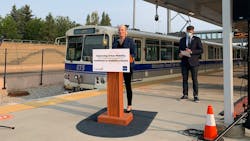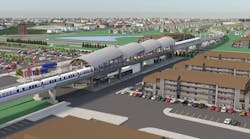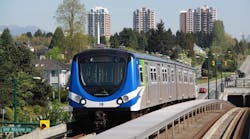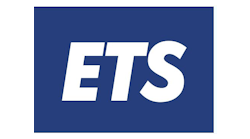Government of Canada to fund up to C$400 million to Edmonton’s Capital Line South extension
The government of Canada will fund up to C$394.24 million (US$313.30 million) toward the first phase of Edmonton’s Capital Line South Extension. The light-rail project will add 4.5 kilometers (2.8 miles) of double track south of the Capital Line’s existing terminus of Century Park and is part of the city of Edmonton’s Transportation Master Plan to expand light-rail service northwest, northeast, east, southeast, south and west of the city center by 2040.
The federal government funding commitment comes slightly more than a month after Edmonton City Council approved its municipal contribution to the project of C$333 million (US$264.64 million); the government of Alberta is providing C$300 million (US$238.41 million) to the project. The Capital Line South Extension will be built in two phases with Phase 1 bringing the line south from Century Park to Ellerslie Road and Phase 2 extending the line further from Ellerslie Road to Allard/Desrochers.
"Investing in public transit is at the heart of a clean and inclusive recovery. That's why the government of Canada is investing almost C$400 million for the Edmonton Capital Line South Extension – Phase 1 LRT Project from Century Park to Ellerslie Road, to reduce commute times and help Edmonton residents, including workers, students, seniors and families get around in cleaner and more affordable ways. Through this investment we're helping take more cars off the road and reduce emissions, create good jobs and build more inclusive communities,” said Canada’s Minister of Infrastructure and Communities Catherine McKenna.
The first phase of the light-rail extension includes two stations at Twin Brooks and Ellerslie, an underpass at the 23 Avenue crossing and a new bridge across Anthony Henday Drive. The project also includes an operations, maintenance and storage facility, the purchase of 24 electrically-powered, high-floor light-rail vehicles, as well as the expansion and integration with the Heritage Valley Park and Ride Facility.
"A strong public transit system is the backbone of livable, competitive cities. By connecting some of the city's fastest-growing communities, the Capital Line South LRT extension strengthens our economic and environmental prosperity. An expanded LRT network contributes to a resilient and green economic recovery for our city and will result in faster commutes and less gridlock. Our federal and provincial partners prove that, with this strategic investment, all orders of government contribute to our economic and social prosperity,” said Edmonton Mayor Don Iveson.
When the line opens, it is expected to serve up to 9,600 people per hour per direction during peak five-minute service and will run every 10-15 minutes during off-peak periods, with service integrated with the cities’ other transit services. The extension also aims to create more than 9,500 jobs, reduce greenhouse gas emissions by more than 269,000 metric tons by 2050 and will see 11.9 million fewer vehicle kilometers travelled in its opening year of operation.
"Alberta's government recognizes this is a critically important project, not just for Edmontonians, but for all Albertans. Alberta's ongoing commitment to Edmonton's LRT network will help to support Edmonton transit users and Alberta's recovery from the COVID-19 pandemic by creating local jobs. By supporting this project, the government of Alberta is laying the groundwork for the future of transit in the city's fastest growing area," said Alberta’s Minister of Transportation Rajan Sawhney

Mischa Wanek-Libman | Group Editorial Director
Mischa Wanek-Libman is director of communications with Transdev North America. She has more than 20 years of experience working in the transportation industry covering construction projects, engineering challenges, transit and rail operations and best practices.
Wanek-Libman has held top editorial positions at freight rail and public transportation business-to-business publications including as editor-in-chief and editorial director of Mass Transit from 2018-2024. She has been recognized for editorial excellence through her individual work, as well as for collaborative content.
She is an active member of the American Public Transportation Association's Marketing and Communications Committee and served 14 years as a Board Observer on the National Railroad Construction and Maintenance Association (NRC) Board of Directors.
She is a graduate of Drake University in Des Moines, Iowa, where she earned a Bachelor of Arts degree in Journalism and Mass Communication.





